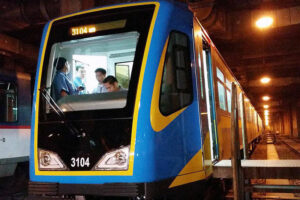
Doubts raised about Dalian train arbitration
DOUBTS have been expressed about the prospects of the Transportation department’s plan to seek an arbitration ruling against Chinese train maker CRRC Dalian Co. Ltd.
“Arbitration on the Dalian trains will have a poor chance of success. The railcars have been with the DoTr for the last eight years, during which time they have plenty of time to return the cars or seek a refund. Arbitration (only means) more income to foreign consultants,” Rene S. Santiago, former president of the Transportation Science Society of the Philippines, said via Viber.
The Department of Transportation (DoTr) is considering seeking an arbitration ruling against CRRC, Transportation Secretary Jaime J. Bautista said on the sidelines of an event last week.
“There will be liquidated damages because they were unable to meet our requirements. But of course, subject to agreement. We should be fair and reasonable in terms of what should be collected from Dalian,” Mr. Bautista said.
“There’s a possibility that this leads to arbitration. In fact, I am seeing that this leads there.”
The possible pursuit of arbitration could go forward before the planned privatization of the operations and maintenance of Metro Rail Transit Line 3 (MRT-3), which is expected by 2025.
The government procured the Dalian trains in 2014, with deliveries taking place in 2016. The trains were expected to increase the capacity of the MRT-3 to 800,000 passengers daily.
Mr. Bautista said that the Dalian trains were too heavy to use the MRT-3 tracks.
Operating them “would result in higher maintenance costs and would also result in higher operating costs,” he said.
For now, the DoTr is still working with the Chinese train maker to determine how to operate the trains for the MRT-3.
Earlier, the DoTr said it is hoping to auction the operations and maintenance contract for MRT-3 by 2025.
The private rail line concessionaire may still opt to use the rail cars once it takes over the operations and maintenance of MRT-3, Mr. Bautista said, adding that one of the proponents has submitted a proposal detailing how to operate the Dalian trains.
“A private concessionaire can find ways to combine the Czech & Dalian trains efficiently by exploring parts standardization,” Mr. Santiago said.
Nigel Paul C. Villarete, senior adviser on public-private partnership at the technical advisory group Libra Konsult, Inc., said having the concession holder come up with a solution to operate the unused trains would be a better option, rather than seeking arbitration.
“If these trains can be used, I think we’d better use them rather than completely repudiate the purchase. They may want to do a full financial and economic comparative analysis on the options to take,” Mr. Villarete said via Viber.
However, he said that operating the unused trains once the private concessionaire takes over would entail higher maintenance costs, which can be passed on to consumers if viable. — Ashley Erika O. Jose



